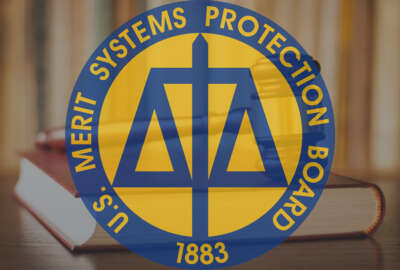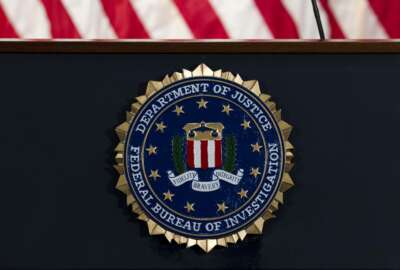
Lots of new developments on the whistleblower front
The omnibus appropriations bill enacted last year, contains something called the Anti-Money Laundering Whistleblower Improvement Act.
The omnibus appropriations bill enacted last year, contains something called the Anti-Money Laundering Whistleblower Improvement Act. The Federal Drive with Tom Temin next guest on this podcast, calls it the most important transnational anti-corruption whistleblower law since the Dodd-Frank law in 2010. In fact, Stephen Kohn, a partner at the law firm Kohn, Kohn and Colapinto, helped get it passed.
Interview transcript:
Tom Temin This whistleblower issue has been kind of your abiding life story, you might say. Tell us about the Anti-Money Laundering Whistleblower Improvement Act that was just enacted.
Stephen Kohn Sure. So the right of people outside the United States to blow the whistle, be anonymous and confidential and qualify for an awards has been growing since Dodd-Frank, because Dodd-Frank covered the Foreign Corrupt Practices Act. And it’s really been a sea change for fighting international corruption. So we saw this. We then saw very large money laundering cases. And in fact, I represented the whistleblower, in what they believed to be the largest money laundering case ever, which was 240 billion laundered from Russia and former Soviet republics into Western banks over a 10 or 15 year period. And it’s just a disgraceful situation. So we pushed and we advocated for a whistleblower law to cover money laundering. While you would need anonymity and confidentiality, which the law has. But the key was monetary rewards, because if you’re in Russia or you’re in Denmark or you’re in France, our retaliation laws don’t apply. If you’re in a country without a good rule of law, like Russia or many countries around the world, you could be shot for being a whistleblower, especially for money laundering. So we pushed this really hard. We fought for two years. It was so significant at the end, because we were able to point out that money laundering is how the Russians move their dirty cash by the billions. We’re also able to show that’s how you can find out where the oligarchs money is. So at the very end of the entire legislative process, they put this bill onto the federal budget and they decided not only to cover money laundering, but to cover sanctions, sanctions busting as well. All to help fight those trying to police Russian dirty money.
Tom Temin And in many ways, then you expect this to aid federal law enforcement.
Stephen Kohn Well, that’s the key. So what this law does is it permits people with inside information, even if they reside outside the United States, to give that information to either the Department of Justice or the Department of Treasury. All designed to really incentivize the highest quality information from insiders to the law enforcement officials that have the ability to prosecute.
Tom Temin And these people then would blow the whistle, not to the company management, say, that’s doing the money laundering that they might say begin with in the United States based case, but to U.S. officials?
Stephen Kohn Correct. So money laundering is really the heart of the worst forms of corruption. If you’re going to pay a bribe, you don’t put the bribe money in your own account under your name. Drugs, they don’t put it under their name. They create phony accounts, phony identities. That’s money laundering, hiding beneficial ownership. So money laundering gets terrorist financing drugs, tax evasion, bribery. So you’re really looking at some really dirty activities. But when it comes to Russia, specifically, what we know from this very large money laundering case that came out of Danske bank, is that the Russians wanted to move their money outside of Russia. In the Danske case, it was proven that the Russian secret police, the [Federal Security Service (FSB)], was laundering money and Putin’s family. So they wanted to move the money out. Now, once they the money left Russia, it went through New York banks, but then it could go back into France, Italy. It could go anywhere. It’s just laundered money where the true owners aren’t known. So this is really strikes at the heart of corruption. And that’s why permitting people who are non U.S. citizens to use this law and obtain rewards. It was really the heart of the reform that we obtained in December 2022.
Tom Temin All right. We’re speaking with attorney Stephen Kohn. He’s a partner at Kohn, Kohn and Colapinto. And at the same time, you’re reporting that the Justice Department is kind of dropping the ball, in the headline words here, for fraud cases. And it seems like under False Claims Act that whistleblowers of any sort, whether it’s false claims or international money laundering, need to know that the case will actually get taken up.
Stephen Kohn Exactly. So the problem with all whistleblower laws is sometimes the institutional resistance of bureaucracies. So the U.S. Department of Justice, in my view, is schizophrenic. We deal with DOJ, prosecutors and investigators who are fantastic. The honor confidentiality, they’re dedicated. They do a brilliant job. Well, there are others in the department that are clearly hostile to whistleblowers. And really, I mean, it’s just bad news, we’ll put it that way. The good part about this money laundering bill, and I hope it’s a game changer. I hope it is implemented properly, because although the Dodd-Frank Act permits anonymous and confidential whistleblowing to the [Security and Exchange Commission (SEC)] and to the Commodity Futures Trading Commission, up until the AML law, the Justice Department was not required to accept confidential and anonymous whistleblowing information in any of the reward laws, including false claims that they administer. Because they weren’t required to have a whistleblower office to accept anonymous complaints, there was no real coherency within the Justice Department, how they dealt with whistleblowers. This law requires justice to accept anonymous complaints. Therefore, justice must implement rules to accept anonymous complaints, which means training of the officials of the Justice Department who will be interacting with these anonymous and confidential whistleblowers. Within the SEC, we saw that this level of legal requirement had a fantastic positive impact. It really forced that agency to have an effective whistleblower program. The same needs to happen with the Justice Department.
Tom Temin And just a quick detail clarification. Someone who’s confidential in analysis and anonymous is known to the Justice Department. They’re just not known to the party against which they’re blowing the whistle?
Stephen Kohn No. This is what’s brilliant about the law. The government doesn’t know who the whistleblower is. They have to work with an intermediary, which is a U.S. licensed attorney. So it’s up to the government to develop the trust of the whistleblower so they will voluntarily reveal their identity and become an effective cooperating witness. But the power has shifted where a whistleblower could walk into justice and they could really treat them, as they say, how they wanted to treat them. There was no coherent program. Some were fantastic, some were not. Now, if they come in under the AML program, the government doesn’t know who their most important sources of information or they don’t know who these people are. So the government has to change its philosophy and its culture toward the whistleblower. So they develop trust and they all work together. Every large case I have done, and we’ve had cases that have brought in millions and even billions in sanctions. At some point, the government always knows who the whistleblower is. They have to. But that is built by trust and professionalism. And that is what we hope will drive this new law into making it super effective.
Tom Temin And just a quick devil’s advocate question before we close. The government needs to know that someone who is say, a lawyer comes in representing an unknown whistleblower. I mean, there are going to be people that just try to game the system. And not every lawyer is, maybe as scrupulous as you are. So how does the government know this is not just a couple of people in collusion to stick it to some company they are mad at, for reasons that have nothing to do with illegality?
Stephen Kohn Sure. So that is the beauty of requiring the licensed attorney, because the licensed attorney has skin in the game. First, it’s their reputation, potential bar charges. If some fraud or manipulation is going on, the government may not know who the whistleblower is, but they can hold the lawyer accountable. So it’s to the the lawyer is really required to do due diligence and present evidence that’s honest. And if there’s any fraud done, you automatically will lose any right to an award. If you lie, you lose your right to an award. If you try to get around certain rules, you lose your rights. So there’s any lawyer who enters these programs as a representative is under tremendous pressure and legal obligation to be very honest. And that’s what we see in the SEC program. I don’t know of any cases right now, where a lawyer has been sanctioned for manipulation of the system, and they have had 65,000 whistleblowers have entered the SEC program. And there is not one public case of a lawyer having a bar charge or any form of sanction.
Tom Temin And you’ve got a new book about rules for whistleblowers coming out soon, by the way.
Stephen Kohn That’s correct. So rules for whistleblowers, which goes over everything a whistleblower needs to know from confidentiality. I have a whole section on the AML law. In fact, all of the whistleblower laws are discussed. It’s coming out in June. And I really, I think if you’re going to blow the whistle, you really need to know how to do it right and what your rights are.
Copyright © 2024 Federal News Network. All rights reserved. This website is not intended for users located within the European Economic Area.
Tom Temin is host of the Federal Drive and has been providing insight on federal technology and management issues for more than 30 years.
Follow @tteminWFED
Related Stories

Congressional oversight leaders ask for GAO review of FBI whistleblower protections




